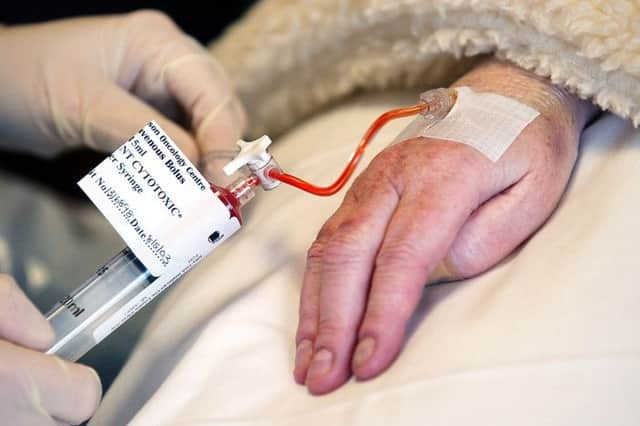Scottish cancer sufferers denied life-saving drugs


Research by the charity Beating Bowel Cancer has found that, while many boards have increased approvals of expensive treatments since the Scottish Government ordered them to be more flexible, in other areas it remained static or decreased and wide variations remained.
It said that, in the case of advanced bowel cancer, only a tiny proportion of patients were getting access to treatment to extend their lives.
Advertisement
Hide AdAdvertisement
Hide AdThe charity called for urgent action to abolish the postcode lottery of treatment access once and for all.
In November, Scotland’s Chief Medical Officer (CMO) issued guidance to health boards telling them to be more flexible in their approach to approving individual patient treatment requests (IPTRs) – the process through which patients may be able to access medicines not generally recommended for NHS use.
The Scottish Government also announced the replacement of IPTR with a new “peer approved clinical opinion system” (PACS) to tackle regional variation, which was due to come in by May but has been delayed.
Beating Bowel Cancer asked health boards for information about IPTR approvals for all patients between July 2013 and April 2014. The majority of requests concern cancer treatments, but patients with other conditions may also apply for drugs if they cannot access them routinely on the NHS.
The research found that many areas increased IPTR approvals following the CMO’s new guidance, but variations remained.
In Ayrshire and Arran, approvals increased from around 60 per cent in July to October to 81 per cent in November to April, while in Dumfries and Galloway approvals rose from 75 per cent to 100 per cent. In Lanarkshire, approvals rose from 64 per cent to 80 per cent, while in Lothian it went from 60 per cent to 91 per cent.
But in Forth Valley approvals fell from 100 per cent to 62 per cent and in Glasgow there was little change, with 72 per cent approved in July to October and 71 per cent in November to April.
The charity also focused on applications made by patients with advanced bowel cancer for drugs not available on the NHS.
Advertisement
Hide AdAdvertisement
Hide AdBut despite the more flexible rules being introduced, they found that only a very small proportion of patients who could possibly benefit were referred for non-approved medicines.
Mark Flannagan, chief executive of Beating Bowel Cancer, said: “We were promised a new system to end this postcode lottery for Scottish cancer patients.
“As this evidence clearly shows, a significant proportion of patients are continuing to miss out on the drugs that could benefit them, dependent on where they live. This is unacceptable. To stop this unfairness, we need to see the immediate implementation of the proposed PACS system promised by cabinet secretary Alex Neil.”
A Scottish Government spokesman said: “After listening to the personal experiences of cancer patients and their families, the cabinet secretary announced plans to overhaul the entire access to medicines system.
“This included the suspension of the old IPTR system and the interim arrangements have already brought about better access to cancer drugs across Scotland – ahead of any decisions being made by Scottish Medicines Consortium through their proposed new approval process.
“Patients in Scotland with colorectal cancer are already able to access a new drug thanks to the decision of the Scottish Medicines Consortium this year.
“We are fully committed to completing the rolling-out of the new peer approved clinical system this summer.”
CASE STUDY
‘It gave us an extra year but many are still denied treatment’
Advertisement
Hide AdAdvertisement
Hide AdAfter campaigning with her husband for equal access to cancer drugs, Jacqui Morrison is disappointed that patients are still struggling to get treatments.
Ian Morrison was diagnosed with bowel cancer in 2011, having surgery and chemotherapy before finding out the cancer has spread to his lymph nodes, then lungs and liver. The couple hoped that a new drug called Cetuximab could help extend his life, but the NHS refused to pay for it.
The Morrisons spent £12,000 on a private course of the drug while campaigning against the postcode lottery of access to treatments. The NHS finally agreed to refund their costs but Mr Morrison died in January this year, aged 57.
Mrs Morrison, from West Linton, said she was very disappointed patients were still struggling for equal access.
“We know first hand that getting access to Cetuximab gave Ian an extra year of life,” she said. “Where it is appropriate for somebody to be given a year of life for £15,000, there’s no comparison.
“It gave us the time. I’ve taken over the business now and if we hadn’t had that year I wouldn’t have been able to do that which would have been bad for the family and the village. More importantly it gave us time to talk things through and come to terms with what was happening.
“It helped myself and the family deal with the situation.”
Mrs Morrison said that, given the pain they went through to get her husband access to the drugs, she had hoped by now that the anomalies would be tackled.